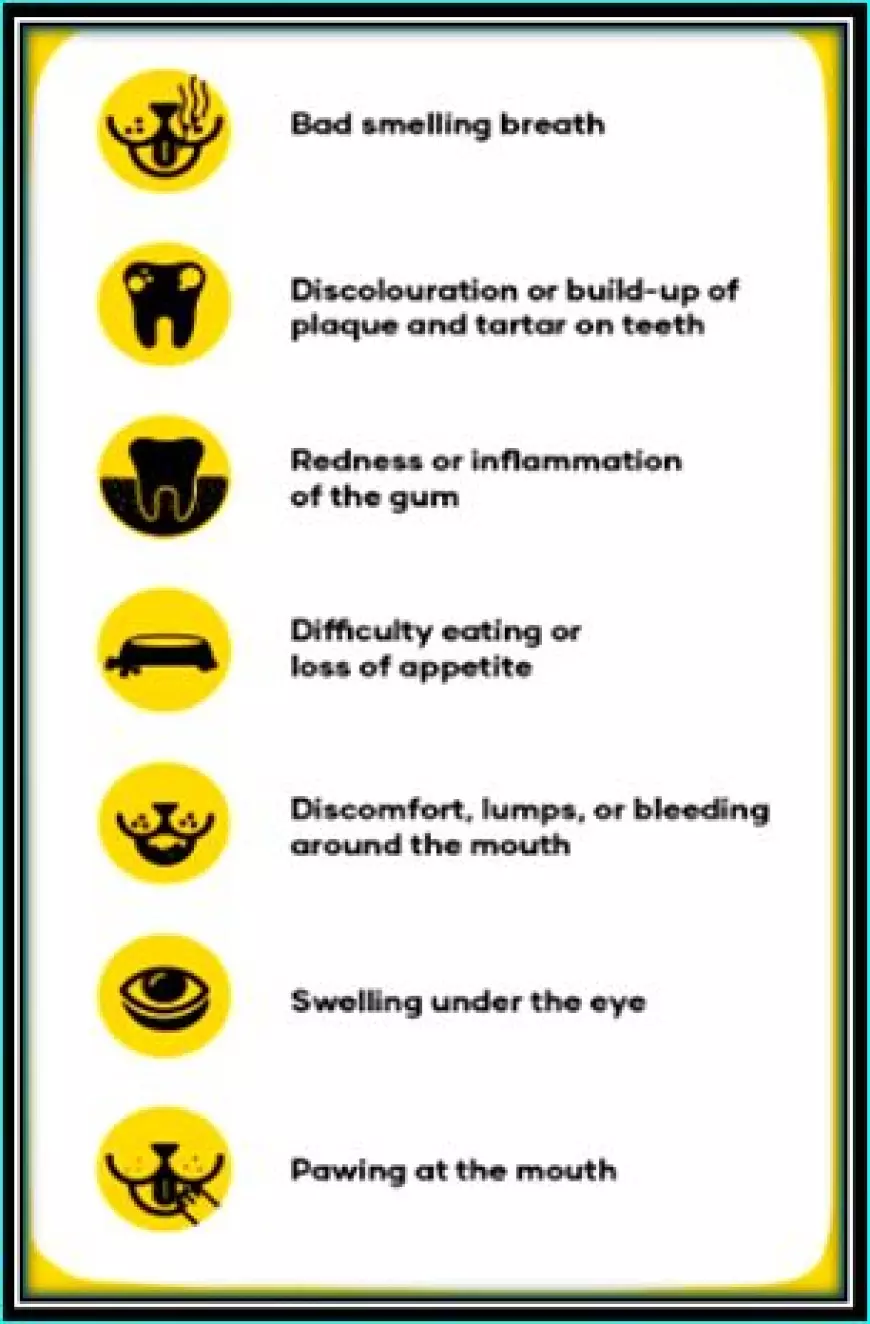What Are the Signs of Dental Problems in Dogs?
Discover the signs of dental problems in dogs. Learn how to keep your furry friend's teeth healthy and prevent oral health issues.

Understanding dental health in dogs
Taking care of your dog's dental health is crucial for their overall well-being. Just like humans, dogs can develop dental problems such as gum disease, tooth decay, and bad breath. However, unlike humans who can communicate when they are in pain, dogs often suffer in silence.
One major issue with canine dental health is the buildup of plaque and tartar on their teeth. Ignoring this buildup can lead to gum disease and further complications that are not only painful for your furry friend but also costly to treat. Regular toothbrushing and dental check-ups at the vet are essential to prevent these issues.
Interestingly, some dog breeds are more prone to dental problems than others. Toy breeds, such as Chihuahuas or Yorkshire Terriers, tend to have crowded teeth due to their small mouths which increases the risk of plaque buildup and periodontal disease. On the other hand, certain larger breeds like Greyhounds are genetically predisposed to weaker gums that may result in loose teeth or tooth loss.
By understanding the importance of maintaining good oral hygiene for your beloved pet and being aware of breed-specific challenges, you can better identify any signs of dental problems early on. This will allow you to take appropriate action and ensure your dog's comfort while avoiding unnecessary pain or expensive treatments down the line.
Importance of oral hygiene for dogs
Oral hygiene is just as important for our furry friends as it is for us humans. Neglecting dental care can lead to a range of issues, including bad breath, gum diseases, and even tooth loss. But beyond these obvious concerns, maintaining oral hygiene in dogs also plays a crucial role in their overall health and well-being.
Did you know that poor dental health can affect your dog's heart and kidneys? The bacteria from infected gums can spread throughout the body, causing inflammation and potentially damaging vital organs. By keeping up with regular teeth brushing or providing appropriate chew toys to promote good oral health, we can help prevent these potential complications.
Additionally, proper oral care for dogs goes beyond just preventing medical issues. It also contributes to their happiness and quality of life. Dogs with healthy mouths are more likely to enjoy their food without pain or discomfort, which in turn improves digestion and nutrient absorption. Plus, regular dental check-ups allow vets to detect any potential problems early on before they become severe or require costly treatments.
Investing time into your dog's oral hygiene not only keeps their teeth shiny and breath fresh but also helps ensure they live a long and happy life free from unnecessary pain or medical complications. So next time you're considering skipping that toothbrushing session or neglecting those annual dental check-ups, remember the importance it holds for your beloved canine companion's overall health and happiness.

Common signs of dental problems in dogs
Dental problems are common in dogs and can lead to severe health issues if left untreated. One of the most noticeable signs is bad breath, or halitosis. While some dog breeds may naturally have stronger breath than others, a sudden change or an unusually foul odor could indicate dental problems like gum disease or tooth decay.
Another sign to look out for is difficulty chewing or loss of appetite. If your dog seems to be avoiding their usual hard food, it could be because they are experiencing pain or discomfort while eating. This can be caused by dental issues such as broken teeth, infected gums, or jaw abnormalities. It's important to address these problems promptly as a lack of proper nutrition can lead to other health complications down the line.
Additionally, pay attention to any changes in your dog's behavior during playtime. Dental issues can make them hesitant to engage in activities that involve biting and mouthing toys or objects. They may also paw at their mouths or exhibit signs of pain when trying to chew on bones or other tough items they usually enjoy. These behavioral changes should not be disregarded as they could be indicative of underlying dental problems that require professional attention.
By familiarizing yourself with these common signs of dental problems in dogs, you can take proactive measures to maintain their oral health and overall well-being.
Potential causes of dental problems in dogs
One potential cause of dental problems in dogs is poor oral hygiene. Just like humans, dogs need regular dental care to prevent the buildup of plaque and tartar on their teeth. If left untreated, this can lead to gum disease, tooth decay, and even tooth loss. Regular brushing with dog-friendly toothpaste and providing chewing toys or treats that promote dental health can help maintain good oral hygiene in dogs.
Another possible cause of dental problems in dogs is a diet lacking in proper nutrients. Dogs require a balanced diet to support overall health, including their oral health. A diet that is high in carbohydrates and low in protein can contribute to the development of plaque and tartar on the teeth. Additionally, certain ingredients commonly found in commercial dog foods may increase the risk of dental issues. It's important to consult with a veterinarian or veterinary nutritionist to ensure your dog's diet meets their nutritional needs.
Overall, maintaining good oral hygiene through regular brushing and providing a nutritious diet are essential for preventing dental problems in dogs. By understanding these potential causes, pet owners can take proactive measures to keep their furry friends' teeth healthy and avoid the discomfort associated with dental issues. Stay tuned for our next blog section where we will explore common signs indicating that a dog may be experiencing dental problems!
Preventive measures for maintaining good dental health in dogs
Proper dental care plays a vital role in keeping our furry friends healthy and happy. Just like humans, dogs are also susceptible to dental problems that can lead to pain, infection, and other serious health issues. Thankfully, there are several preventive measures you can take to maintain good dental health in your canine companion.
Firstly, regular brushing is essential for preventing plaque buildup and maintaining healthy gums. Using a toothbrush and toothpaste specially designed for dogs, gently brush your dog's teeth at least 2-3 times a week. It may take some time for your dog to get used to this routine, so be patient and introduce the process gradually.
In addition to brushing, providing them with quality dental chews or toys can help keep their teeth clean and their jaws strong. Look for products that are specifically made for promoting oral health in dogs. Chewing on these items not only helps remove plaque but also satisfies their natural urge to chew.
Furthermore, incorporating dry food into their diet can contribute to better dental health. Unlike wet food, dry kibble creates friction against the teeth while chewing, which helps reduce tartar buildup over time.
By following these simple preventive measures regularly and consistently, you can significantly decrease the likelihood of your beloved pooch developing painful dental problems throughout their life. Remember that good oral hygiene is just as important for our furry friends as it is for us humans!
When to seek veterinary care for dental issues
Recognizing dental issues in dogs is crucial, but knowing when to seek veterinary care is equally important. While some dental problems can be managed at home through regular tooth brushing and other preventive measures, certain signs should never be ignored. If your dog demonstrates persistent bad breath, excessive drooling, difficulty eating or chewing food, pawing at the mouth, or bleeding from the gums, it may indicate a more serious dental issue that requires immediate attention.
Seeking veterinary care for dental problems is crucial because neglecting such issues can lead to severe consequences. Tooth decay and gum disease not only cause pain and discomfort for your furry friend but also put them at risk of developing infections that can spread throughout their body. Additionally, underlying dental issues could be indicative of more significant health problems such as kidney disease or diabetes. By seeking prompt professional help, you can provide your dog with the necessary treatment to alleviate pain and prevent potentially life-threatening complications.
Remember that prevention is always better than cure when it comes to animal health. Regular dental check-ups play a vital role in maintaining your dog's oral hygiene. A veterinarian will perform a comprehensive examination of your pet's teeth and gums while identifying any potential issues early on. They may recommend professional cleanings if necessary or prescribe medication to address specific concerns effectively.
In conclusion, being attentive to signs of dental problems in dogs is crucial for their overall well-being. Understanding when to seek veterinary care ensures timely intervention and prevents potential complications down the line.
Conclusion: Taking care of your dog's oral health
In conclusion, taking care of your dog's oral health is crucial for their overall well-being. Poor dental hygiene can lead to various health issues such as gum disease, tooth decay, and even infections that can spread to vital organs. By regularly brushing your dog's teeth and providing them with appropriate chew toys or dental treats, you can help prevent these problems from occurring.
Furthermore, maintaining good oral health in dogs can also have a positive impact on their behavior and quality of life. Dental pain and discomfort can cause dogs to become irritable or withdrawn, affecting their ability to socialize and enjoy daily activities. By prioritizing your dog's oral health, you are not only ensuring they have a happy smile but also improving their overall happiness and well-being.
Remember, prevention is always better than cure when it comes to dental problems in dogs. Consult with your veterinarian for advice on the best dental care routine for your furry friend and make it a part of their regular healthcare routine. With proper attention to their oral hygiene needs, your loyal companion will continue enjoying a healthy and vibrant life by your side.







